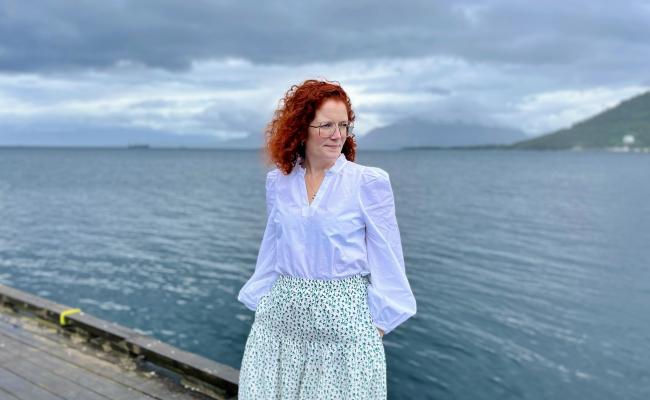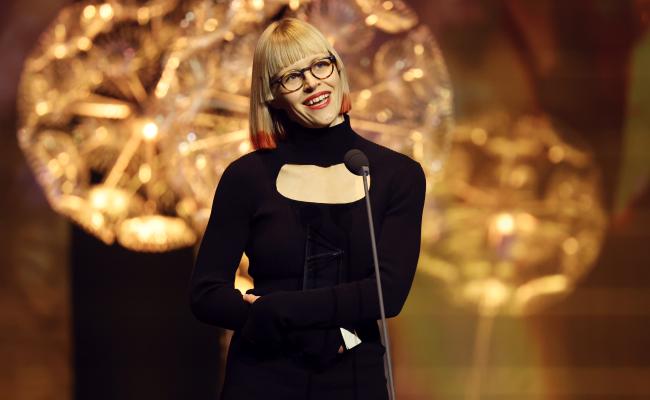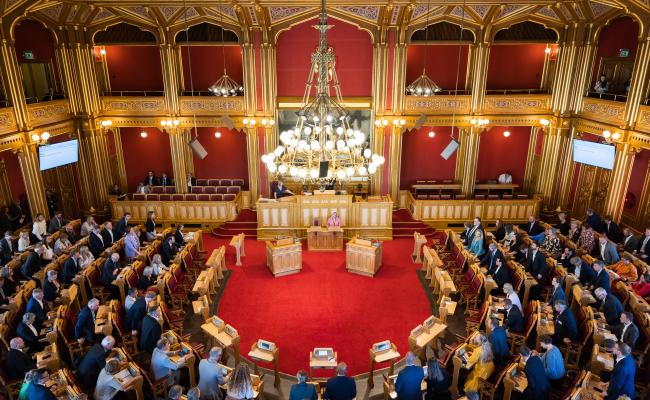High Noon: Icelandic Author Couple: Literature Allows Us To Explore Everything, Including the End of the World
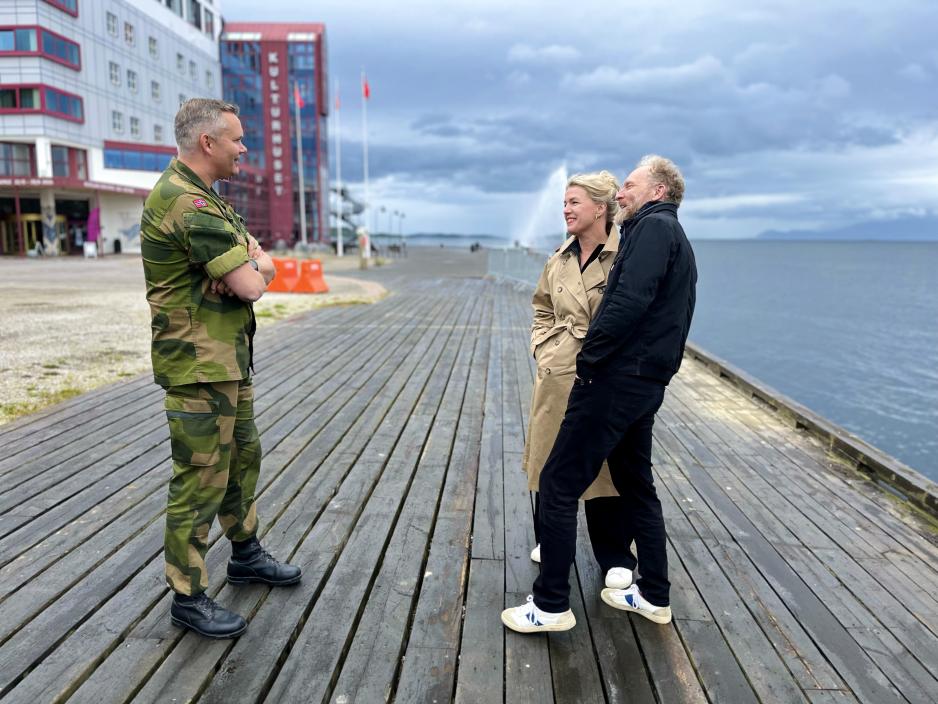
Guests at High Noon on Tuesday: The Icelandic authors Sigríður Hagalín Björnsdóttir and Jón Kalman Stefánsson in conversation with a leader in the Norwegian Army; Commander of Brigade Nord, Brigadier Terje Bruøygard. (Photo: Astri Edvardsen)
Harstad (High North News): "We Icelanders never prepare for anything," says the author couple Sigríður Hagalín Björnsdóttir and Jón Kalman Stefánsson. They admire the Norwegian practical preparedness thinking but also remind us of the resistance power of traveling literature and maintain that a preparedness storage must also include a book and a ukulele.
This week, the debate series High Noon has been organized in Harstad, Northern Norway, through a collaboration between the Arctic Arts Festival and High North News.
The topic of Tuesday's debate was resilience in the North.
The Arctic is warming, and the forces of nature we feel are violent and invasive. At the same time, the world we live in is uneasy, and there is war in Europe.
Guests from Iceland: The author couple Jón Kalman Stefánsson and Sigríður Hagalín Björnsdóttir. The latter is also a journalist RÚV, the Icelandic broadcaster.
Of current interest: Author conversations during the Arctic Arts Festival in collaboration with the Hamsun Center. Stefànsson has particularly been acknowledged for his novel trilogy Heaven and Hell, The Sorrow of Angels, and The Heart of Man. In Norway, Björnsdóttir is perhaps most known for her novel Eyland.
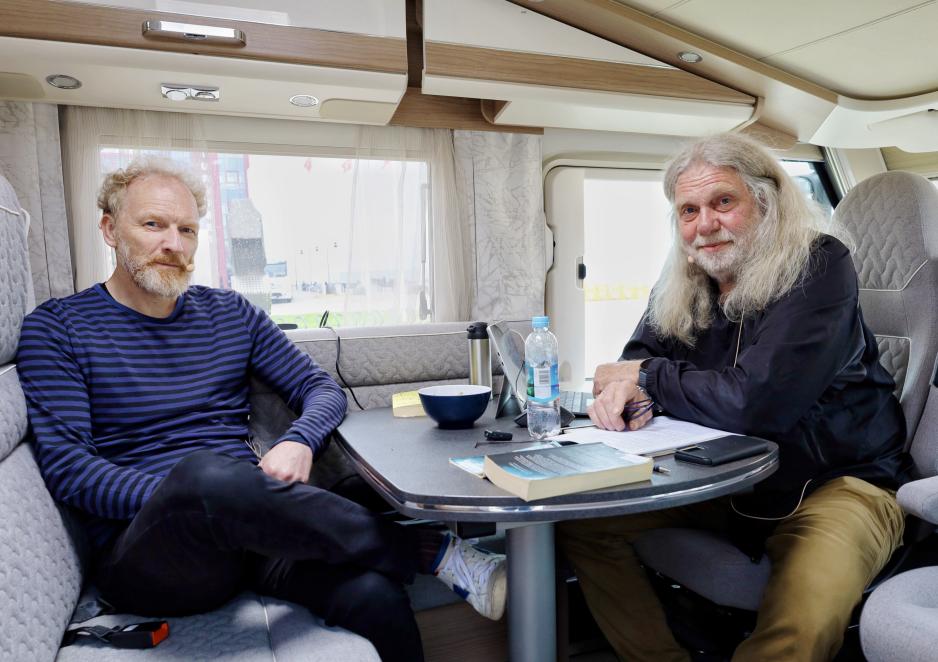
Jón Kalman Stefánsson in conversation with High North News' Editor Arne O. Holm, leading the debate series High Noon. (Photo: Astri Edvardsen)
The power of traveling literature
Through his many years of fiction writing, Jón Kalman Stefánsson has a different approach to resilience and preparedness than the tangible, planned, and practical one.
"Reflecting on our times, I feel that it has never been more important to write, publish, and translate books. We have all these populists and big changes in the world. Newspapers and journalism as a whole are not as strong as before due to both social media and populism. That is why literature is even more significant," he says and continues:
"I have always believed that poetry and art can affect people – and if it influences people, it also influences the world. By reading books from other parts of the world, translated from other languages, you also get to know the world."
"This can tear away the basis for fear and prejudice. So you can say that resilience exists and has always been present in the culture – in novels and poetry."
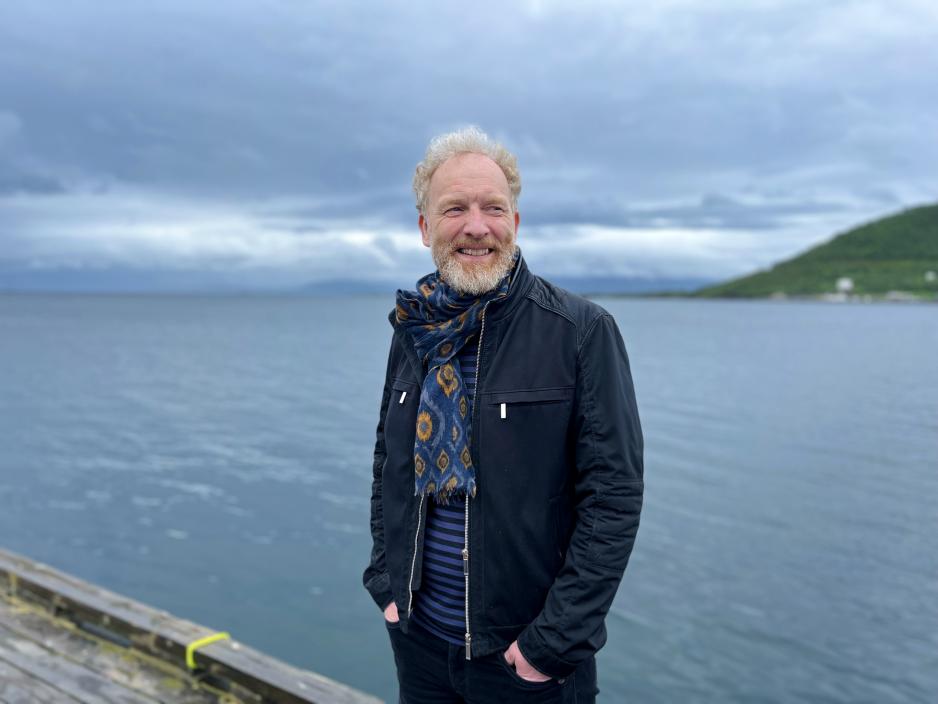
In his breakthrough novel Sumarljós, og svo kemur nóttin (Summer light, and then comes the night), Jón Kalman Stefánsson writes about a fishing village in West Iceland. For this book, he received the Icelandic Literature Prize in 2005. His books have today been translated into a total of 27 languages. (Photo: Astri Edvardsen)
The way forward in fiction
His wife, Sigríður Hagalín Björnsdóttir, has the longest tenure as a journalist but also finds an important source of resilience in writing and reading fiction.
"I tried to understand and describe the world through journalism for a long time. So, when I started writing my first book a few years ago, I discovered that fiction can actually be a better tool for grasping and portraying the world than factual journalism."
"Conducting journalistic work and conveying facts is very important, but fiction gives new dimensions to ways of thinking. You can start from journalistic themes and approach them in new ways. When writing fiction, the subconscious is set in motion," Björnsdóttir points out.
Her novel Eyland deals with what would happen if Iceland suddenly became completely isolated from the outside world. No ships or planes would arrive, and all communication channels have stopped working.
"I concluded that tackling such a scenario would be an incredibly interesting thought exercise. What could happen to society? How would we respond – both as individuals, as families, and as a nation? What could happen to our democratic processes?"
"This book came to be because I feel it is important that we think, write, and talk about what is difficult. Dangerous. Unpleasant. In this, there is a kind of preparation, an important preparedness, I think. In a way, it is also about journalism, about the importance of having people who dare to ask critical questions that can cause discomfort."
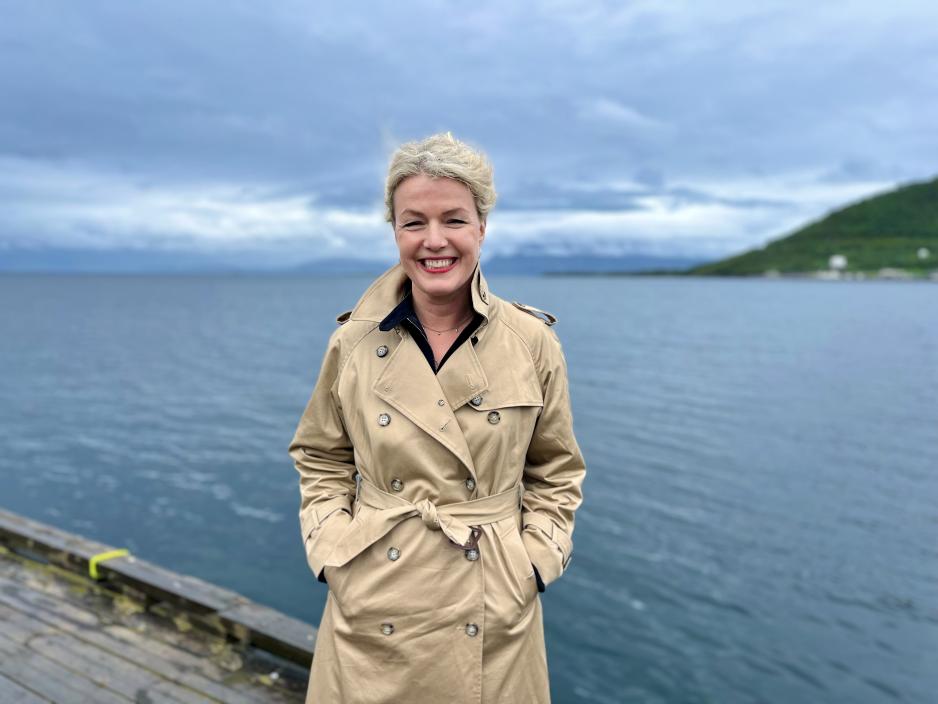
"I think that the fear of isolation lies deep in us Icelanders, who live quite remote from from our outside world," says Sigríður Hagalín Björnsdóttir, author and journalist in RÚV. She has received great international attention and awards for Eyland and her other books. (Photo: Astri Edvardsen)
The comet is coming
When High North News speaks to the couple, they have just taken part in the aforementioned debate – which explored the danger of escalating crisis and nuclear war, with Russia and the West as parties.
The idea of what could wipe out or seriously shake our world lies in the back of our minds as we talk, along with the image of climate change destroying and straining nature at the cost of human and animal life.
Heavy and complex topics. Truly terrifying. However, we can find a way to deal with them in the literature, according to Björnsdóttir and Stefánsson.
"Writing is a very good way to think about complicated subjects, in my experience. I think that it is very important to think and write about things like the end of the world. It can also be done in a resourceful way," she points out.
"One of my favorite novels is Comet in Moominland, written by the well-known Finnish-Swedish author Tove Jansson. When I was little, we were always afraid of nuclear war – and it was very liberating to read a children's book about the end of the world. So, what do you do when everything comes to an end? Is it permissible to dance when the world is ending? Can you buy new pants? Or what can you do?" laughs Björnsdóttir.
"The fact that a children's book addresses this topic in a very sweet and humorous way shows that literature has no boundaries. You can write about anything for anyone. In a way that just works. This is very liberating, I think."
Comedy bomb
"Literature has no limits when it stands strong. One of the first things dictators do is restrict what authors write," her husband points out.
"Yes. And they also try to curb the humor," she adds.
"Yes. Yes! The humor is the first thing to be curtailed. Because humor is the most dangerous thing for them. If you are a dictator or a populist, you have no weapons against humor. The best atomic bomb you can think of is comedy and humor. It is not destructive, but impossible to resist," he says.
Can literature with humorous approaches to these serious topics mobilize us not only to reflect but also to take practical, tedious measures – such as making sure to have enough water, crisp bread, and canned food on hand – something many of us put off for the longest time?
"I believe, first of all, that poetry, be it novels or plays, can be about anything. It can also be about crisp bread and the end of the world. Tove Jansson's book, which Sigríður highlighted, treats the difficult in such a wonderful way – and with such great humor – that it feels good inside. I am sure that a good writer can write brilliantly about such measures and necessities of life," replies Stefánsson.
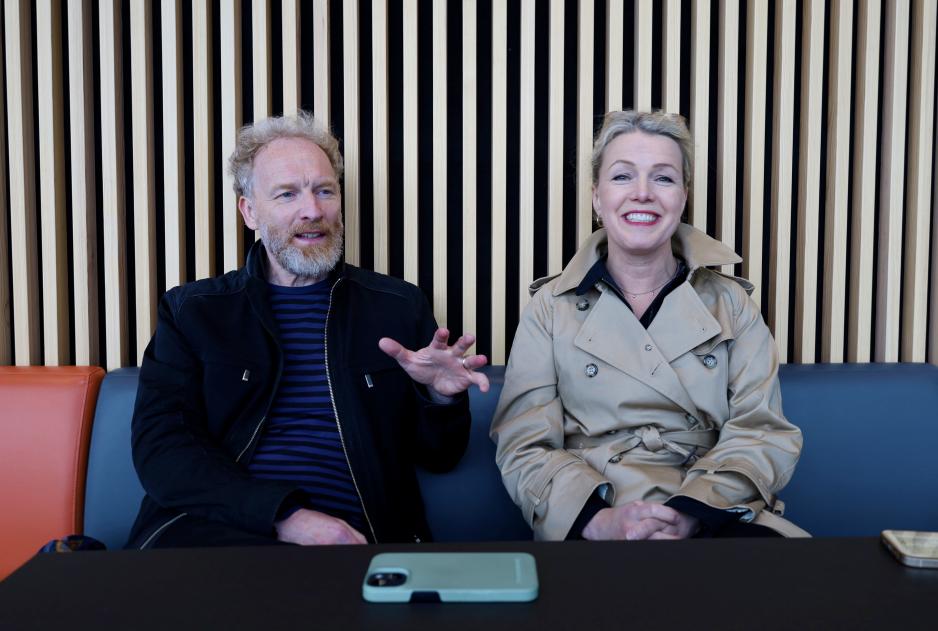
Gálgahúmor (gallows humor) is important, believes the cheerful author couple. While gallows humor can take a slightly different form in different countries, it is something that binds us people together," she says. "Yes. Humor is one of the top three most important things in the world!" he maintains (Photo: Astri Edvardsen)
Crisp bread
"You could have written a book about crisp bread. After all, it's almost only what you eat," Björnsdóttir points out with a laugh.
The husband chuckles along.
"But it could have been an amusing book. About worrying about exactly how much water and crisp bread you should have at home," he continues.
"At the same time, it should not have an educational purpose," she insists.
"No. Not at all," he agrees.
"Trying to use a novel to teach people about something practical will not work," she says.
"Yes. Yes. Then you are on the wrong path," he agrees.
Book and ukulele
"But literature can help with feeling compassion for people in difficult situations. You can also be stimulated to help yourself. As I have discussed, I think it is healthy and important to think about what is uncomfortable and demanding," says Björnsdóttir and continues:
"It is among the tools we have for survival, that we can prepare ourselves for something fateful to happen and think about how to handle it. What can I do in a challenging situation? What can I do for my family, my neighbors, and strangers? If you reflect on this in advance, I think it will be easier to react if something happens."
"Yes. Yes. As I just came to think that it will not be enough with water, crackers and canned goods. You must also have a book. If the world is going crazy, you need a book to read," emphasizes Stefánsson.
"And then a ukulele for music!" she suggests.
"Yes. Yes. He, he."
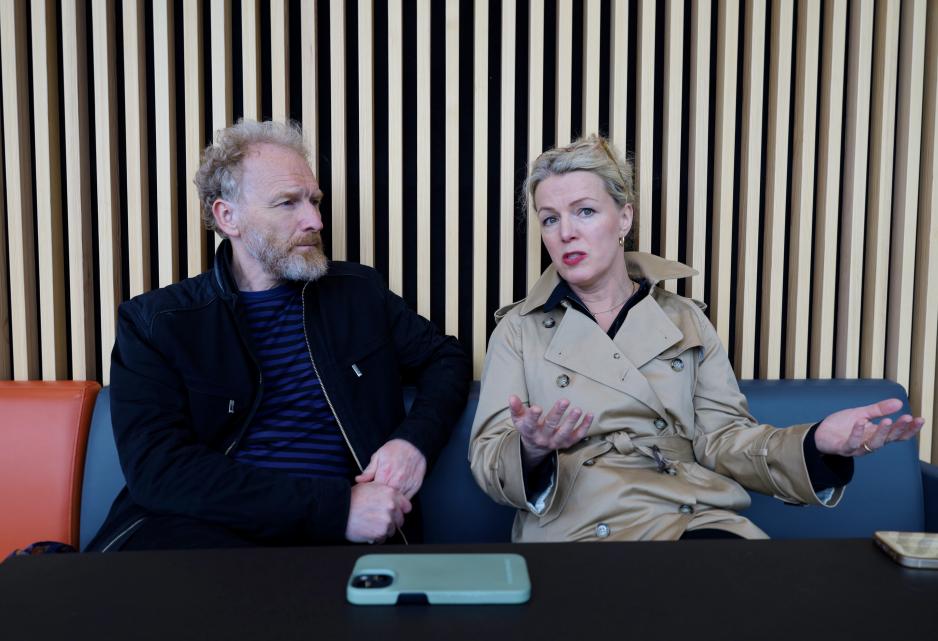
Björnsdóttir advocates against the tendency to "peel away" what is threatening and might scare us, both on an individual and societal level. "As a journalist, I experience that the Icelandic authorities tend to say that 'we shouldn't scare people'. Many scientists would like to thoroughly inform the citizens on the island's great volcanic activity, but the authorities stand between and filter the information. This is not how it should be in a democratic society," she says. (Photo: Astri Edvardsen)
Bad at preparation
Coming to Harstad in Northern Norway and taking part in the discussion about resilience and preparedness was in itself thought-provoking for the two Icelanders.
"As we talked, I felt that I was in a completely different time period than in Iceland. We have no military forces or experience a threat from a neighboring country. Of course, I have read that, in Norway and Denmark, people talk about war, crisp bread, and preparedness, but it feels so far away from Iceland," says Stefánsson.
"In a way, it opens one's eyes to how serious the situation is for many in the Nordics, that the war is closer here than in Iceland. It is very scary but also interesting", he continues.
On the island in the middle of the North Atlantic, there is not only low awareness of the danger of an escalating military conflict in Europe, but also more generally about preparedness, according to the pair of authors.
On the island in the middle of the North Atlantic, there is not only low awareness of the danger of an escalating military conflict, but also more generally of preparedness, according to the pair of authors.
"I got the same feeling as Jón. It struck me that we Icelanders are either ignorant, naive, or stupid because we do not think about preparedness. We Icelanders are just generally terrible at preparing for anything," laughs Björnsdóttir.
Different contributions
"However, I also think that it is good to know that there are people who are on the job. When one listens to the panelists Terje Bruøygard, the Commander of Brigade Nord, and Gunhild Hoogensen Gjørv, professor of security, one senses that they are taking the idea further," she notes and continues:
"They ask themselves important questions: 'What if this and this happens? What do we do then?', and so they plan and prepare. That very competent people are working with this feels comforting – and then the two of us, on our part, can continue to write and try to contribute something good to the world," she notes.
"Yes. Yes. Trying to preserve humanity," he adds.
"Contribute to preserving this small, small piece of what we call civilization," she continues.
"Yes. This small piece that is absolutely necessary," he maintains.
Peace, democracy, and nature
What should we discuss going forward within the context of resilience and preparedness?
"Hmm ... Give peace a chance," Björnsdóttir says.
"Finding peace is the only solution that will work. It is, of course, easy to say but difficult to achieve – and many terrible forces are at play. Yet, we must not give up hope for peace. Quite simply because it is the only thing that can save our future is that we find a way to live together on this earth," she argues.
"We also have a great responsibility for democracy. We still have a strong democracy in the Nordics – and together, we can have a powerful voice worldwide. We also still have, perhaps except Denmark, large, untouched nature. This is becoming more and more important. Thus, we have a big responsibility for democracy and nature – and we have to discuss how to tackle this," states Stefánsson.
The panel
These also participated in the debate:
- Brigadier Terje Bruøygard, Commander of Brigade Nord
- Aslat Simma, reindeer herder in Karesuando and Sami Parliament representative on the Swedish side of Sàpmi
- Gunhild Hoogensen Gjørv, Professor of Security and Geopolitics at UiT – the Arctic University of Norway
WATCH THE DEBATE HERE (Norwegian only):
The debate series
High Noon also includes the following debates:
- Monday 24.06: Formative Conditions in the North – Outsiderness and Youth Culture Violence (in Norwegian)
- Wednesday 26.06: Nordic democracy under pressure? (in English)
- Thursday 27.06: Artists as moral compasses (in Norwegian)




